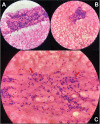Schmidt's Syndrome: An Uncommon Cause of Spontaneous Hypoglycemia
- PMID: 38957156
- PMCID: PMC11216804
- DOI: 10.1055/s-0044-1779745
Schmidt's Syndrome: An Uncommon Cause of Spontaneous Hypoglycemia
Abstract
Schmidt's syndrome, or autoimmune polyendocrine syndrome type 2 (APS-2), is an uncommon disorder characterized by the co-occurrence of autoimmune thyroiditis and adrenalitis. APS-2 is defined as a combination of Addison's disease, autoimmune thyroid disease, and/or type 1 diabetes mellitus. It is an autosomal dominantly inherited polygenic disorder with incomplete penetrance; the candidate genes include but are not limited to HLA-DR3, HLA-DR4, CTLA-4, PTPN22, and CD25-IL-2. Autoimmune thyroiditis, often Hashimoto's disease, results in hypothyroidism. Primary adrenal failure results in enhanced secretion of adrenocorticotrophic hormone melanocyte and co-secretion of melanocyte-stimulating hormone, contributing to hyperpigmentation. Mineralocorticoid deficiency results in salt wasting, fatigue and cramps, postural hypotension, and hyperkalemia. Cortisol, an insulin counter-regulatory hormone, plays a pivotal role in maintaining euglycemia; deficiency predisposes to the development of hypoglycemia. We here report a rare presentation of Schmidt's syndrome as hypoinsulinemic hypoglycemia in a middle-aged male patient. Management includes treatment of acute hypoglycemic episodes with glucose or glucagon, long-term glucocorticoids and mineralocorticoids for adrenal insufficiency, and thyroid hormone supplements for hypothyroidism. This case report and brief overview aim to contribute to the scientific understanding of Schmidt's syndrome/APS-2. Additionally, here we briefly outline the diagnostic challenges in hypoglycemia evaluation, including the utilization of Whipple's triad and the gold standard supervised 72-hour fast and evaluation for primary adrenal and thyroid insufficiencies.
Keywords: APS-2; Addison's disease; Schmidt's syndrome; hypoglycemia; hypothyroidism; polyendocrine syndrome.
The Author(s). This is an open access article published by Thieme under the terms of the Creative Commons Attribution License, permitting unrestricted use, distribution, and reproduction so long as the original work is properly cited. ( https://creativecommons.org/licenses/by/4.0/ ).
Conflict of interest statement
Conflict of Interest None declared.
Figures
References
-
- Carpenter C C, Solomon N, Silverberg S Get al.Schmidt's syndrome (thyroid and adrenal insufficiency). A review of the literature and a report of fifteen new cases including ten instances of coexistent diabetes mellitus Medicine (Baltimore) 1964. Mar;43153–180. - PubMed
-
- Kahaly G J, Frommer L. Polyglandular autoimmune syndromes. J Endocrinol Invest. 2018;41(01):91–98. - PubMed
-
- Singh G, Jialal I.Polyglandular autoimmune syndrome type II. [Updated 2023 Aug 8] Treasure Island (FL)StatPearls Publishing; 2023. Jan-. Accessed February 2, 2024 at:https://www.ncbi.nlm.nih.gov/books/NBK525992/ - PubMed
-
- Tincani A, Ceribelli A, Cavazzana I, Franceschini F, Sulli A, Cutolo M. Humana Press; 2008. Autoimmune polyendocrine syndromes. - DOI
-
- Eisenbarth G, Wilson P, Ward F, Lebovitz H E. HLA type and occurrence of disease in familial polyglandular failure. N Engl J Med. 1978;298(02):92–94. - PubMed
Publication types
LinkOut - more resources
Full Text Sources
Research Materials
Miscellaneous


